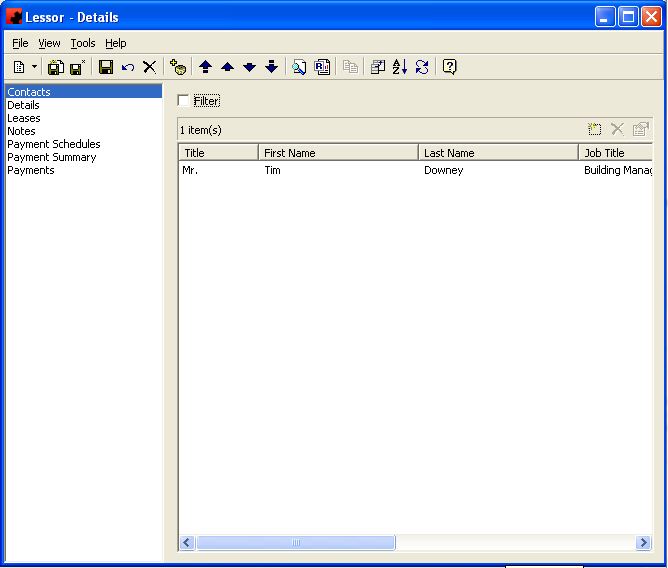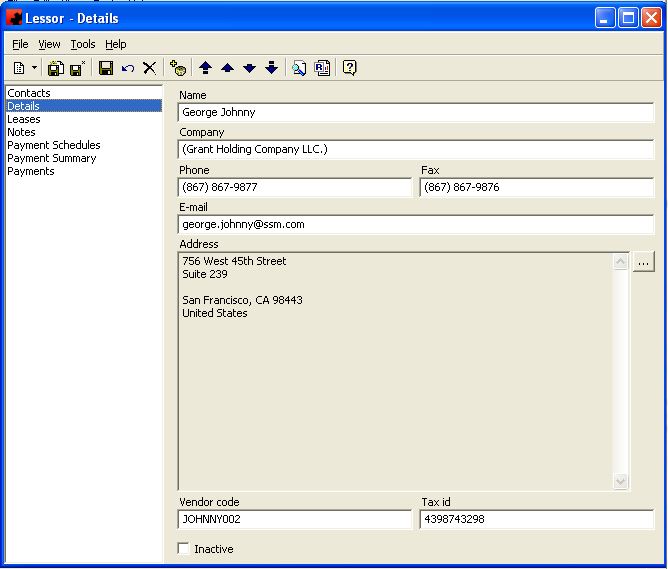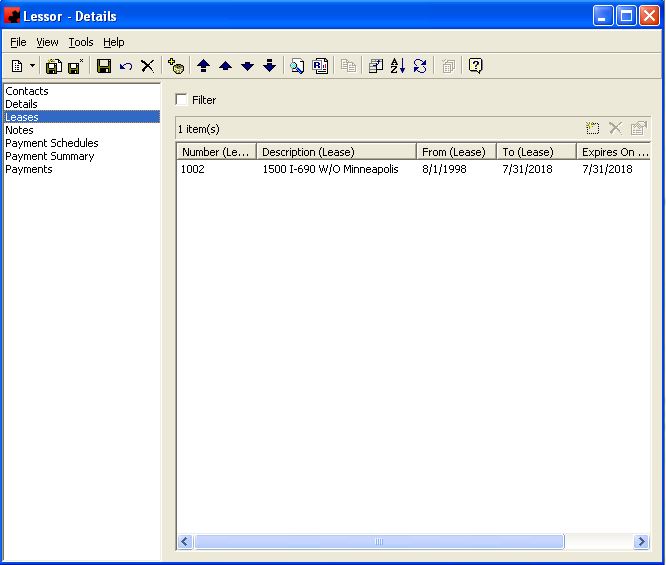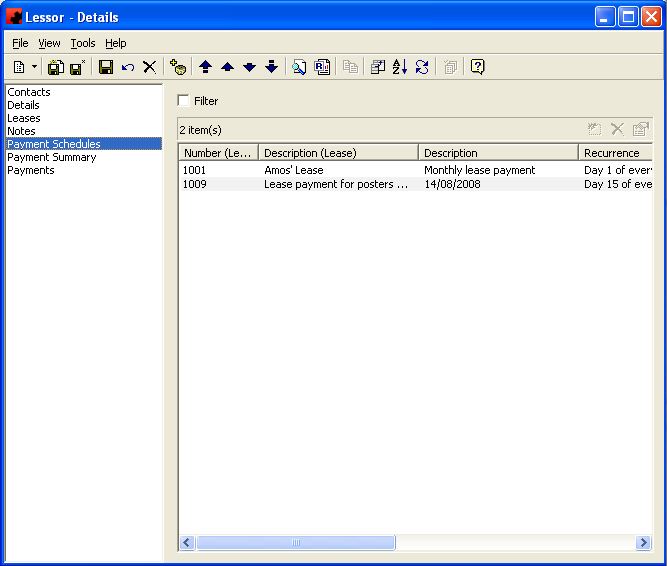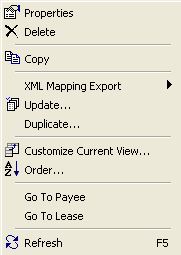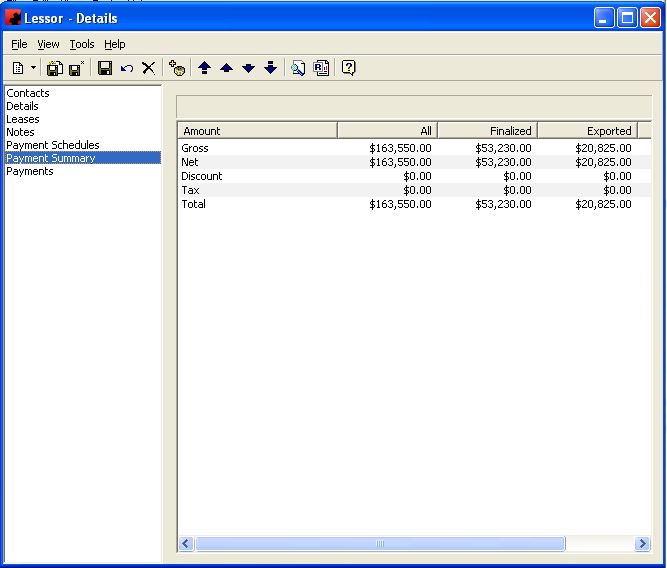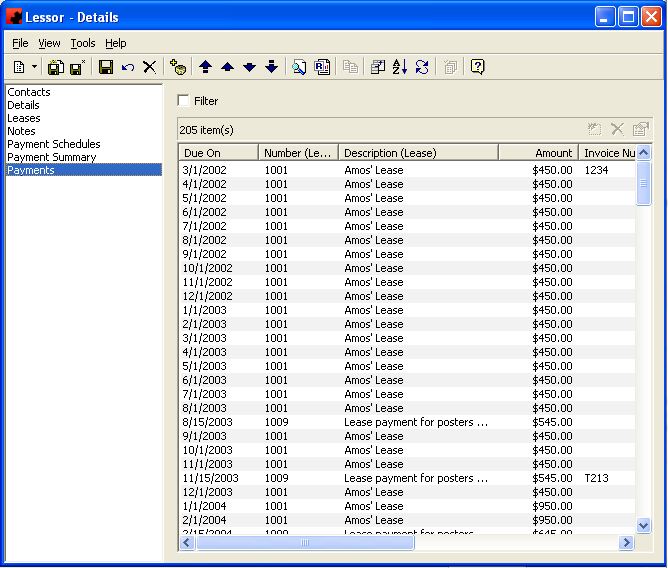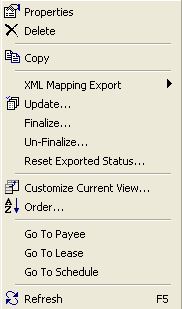Lessors
The Lessors database contains a listing of companies and/or people to whom you are making a lease payment(s). Ad Manager uses this database when setting up a Lease payment schedules and the data may be contained in a financial export.
Contents |
Adding a Lessor
To add a Lessor, click the arrow beside the New icon () for a list of items you can add. Select OTHER, then select Lessor. The Lessor Details window will appear, and a new Lessor can be entered. Enter the First Name and Last Name (if you are paying a person), the Company name (if you are paying a company), Business Phone Number, Mobile Phone Number, Business Fax Number and E-mail Address (as applicable). To add the Address information, click on the ellipsis (
) and enter the Street and/or Postal Box Number, City, State/Province, Zip/Postal Code and Country and then click OK. Enter the Tax Id Number and Vendor Code Number (usually matches one that has been set up in the users' Accounting Package).
NOTE: The Name or Company and Vendor Code fields are REQUIRED fields in order to save the information.
The Notes page allows the user to enter other information about the Lessor, not contained on the Details page.
Modifying a Lessor
To modify a Lessor, simply click the database from the FINANCIAL folder, then double click the desired item and make the change(s) necessary. Once you have finished, click the Save () button.
NOTE: Caution should be taken when modifying the Name and/or Company field because Ad Manager will change ALL references to these fields no matter if the Lease Payments have already been finalized or exported. Ad Manager history will be changed when you modify these fields even though the users' Accounting Package will contain the original details. Should the user wish to maintain historical data, it is recommended that a new Lessor be created as well as a new Lease Payment Schedule.
Deleting a Lessor
To delete a Lessor, there must be no reference to it on a Lease Payment Schedule. Select the database from the FINANCIAL folder, then double click the desired item. Select the Delete button () for the record. Ad Manager will ask you for confirmation to delete the Lessor.
Lessors Pages
Contacts
The Contacts Page is used to enter information referring to all Contact people for a Lessor.
Tool buttons specific to the Contacts Page:
- Customize Current View allows you to select the columns to display and the order to display them in.
- Order allows you to sort the list of Contacts on the Lessor in the desired order.
- The Refresh button will reload the list of Contacts, in the event changes to the number of Contacts has occurred since you visited this page.
The pane in the window shows a listing of all Contacts that are assigned to this Lease. The functions available through the buttons immediately above the pane are:
- Add a new Contact to the Lessor. Click on this button and either select an existing Name from the list or create a new record by choosing < New >.
- Delete the highlighted Contact from the Lessor.
- Edit the information for the highlighted Contact.
For additional information on buttons that appear at the top of the window, click here. For information on the menu items that appear under the Tools menu, click here.
The Filter check box allows you to filter the listing of Contacts to show only those that meet a certain criteria. When selected, a filter screen will appear, allowing you to choose to see Contacts with a certain Name, Phone number, or Address. When a filter is active, a check mark will appear in the filter box. To clear the filter and see all records, click on Filter, then the Clear button on the Filter screen, followed by the OK button.
Details Page
The Details Page is where information about the Lessor is displayed. Lessors or Payees are companies and/or people to whom you are making a Lease Payment(s).
For information on the buttons that appear at the top of the window, click here. For information on the menu items that appear under the Tools menu, click here.
Fill in the appropriate information for each field. Select the appropriate item from any of the drop down lists (in the boxes) or type in the information if it is not present.
Fields
Address: This is the mailing address for the Lessor. To add the ADDRESS, click on the ellipsis () for the Address Builder window and fill in the information accordingly.
Company: This is the name of the company you are paying for a particular Lease. If your Lessor is not a company, but a person, do not fill this field out.
E-mail: The e-mail address of this Lessor.
Fax: This is the Fax number of this particular Lessor.
Inactive: This check box allows you to mark a Lessor as one you no longer deal with by clicking on the check box.
Name: This is the name of the Lessor. If the Lessor is a Company, then leave this field blank.
Phone: This is the phone number of this Lessor.
Tax id: If you are providing your Lessor with Government income statements, you will need to record their tax id code here.
Vendor code: The code assigned to this vendor in your accounting package. This is a required field and must be filled in. The Vendor code in Ad Manager must match exactly the vendor code in your accounting package if you will be exporting lease payments from Ad Manager to your accounting package.
Leases Page
The Leases Page lists all Leases that are associated with this Lessor.
Tool buttons specific to the Leases Page:
- Customize Current View allows you to select the columns to display and the order to display them in.
- Order allows you to sort the list of Leases on the Lessor in the desired order.
- The Refresh button will reload the list of Leases, in the event changes to the number of Leases has occurred since you visited this page.
- The Update button allows you to highlight multiple Leases and apply the same properties to them.
The pane in the window shows a listing of all Leases that are associated with this Lessor. The functions available through the buttons immediately above the pane are:
- Add a new Lease to the Lessor.
- Delete the highlighted Lease from the Lessor.
- Edit the information for the highlighted Lease.
In addition, while you are in the pane, you can double click on a Lease to see details about the Lease. You can also right click in the pane and select "New", "Customize Current View" , "Order" or "Refresh" (see above).
For additional information on buttons that appear at the top of the window, click here. For information on the menu items that appear under the Tools menu, click here.
The Filter check box allows you to filter the listing of Leases to show only those that meet a certain criteria. When selected, a filter screen will appear, allowing you to choose to see Leases that are active, that expire on a certain date, that have a specified number of sites attached, etc. When a filter is active, a check mark will appear in the filter box. To clear the filter and see all records, click on Filter, then the Clear button on the Filter screen, followed by the OK button.
Notes Page
For more information on the Notes page, click here.
Payment Schedules Page
The Payment Schedules Page provides a financial history for this Lessor by showing a listing of all payment schedules that have been set up.
Tool buttons found at the top of the Lessor - Details screen when you are on the Payment Schedules Page:
- Customize Current View allows you to select the columns to display and the order to display them in.
- Order allows you to sort the Payment Schedules in the desired order.
- The Refresh button will reload the list of Payment Schedules, in the event changes to the Payment Schedules have occurred since you visited this page.
- The Update button allows you to select one or more Payment Schedules and change information on them. All highlighted Schedules will be changed to reflect the items selected.
The functions available through the buttons immediately above the Payment Schedules pane are:
- Delete the highlighted Payment Schedule from this Lessor. Highlight the item and click the Delete button.
- Opens the Lease Payment Schedule - Details window to allow you to review or change any information related to the Lease Payment.
Right clicking on the list of Payment Schedules will display this menu. From here you can duplicate the Payment Schedule, change the status of a Payment Schedule as well as any line items by using the Update option.
To change the information being viewed in the list, simply right click in the list, and choose Customize Current View. To change the sort order, simply right click in the list, and choose Order.
Update - The Update menu item allows you to to modify a property (or properties) for one or more highlighted Payment Schedules.
Duplicate - The Duplicate menu item allows you to create a new Payment Schedule with the same Line item configuration as the current Payment Schedule.
Go To - The Go To feature allows you to open a window for the appropriate item for the highlighted record.
For additional information on the buttons that appear at the top of the window, click here. For information on the menu items that appear under the Tools menu, click here.
The Filter check box allows you to filter the listing of Payment Schedules to show only those that meet a certain criteria. When selected, a filter screen will appear, allowing you to choose to see Payment Schedules with certain recurrence patterns, for specific Payees, etc. When a filter is active, a check mark will appear in the Filter box. To clear the filter and see all records, click on Filter, then the Clear button the Filter screen, followed by the OK button.
Payment Summary
The Payment Summary Page allows you to identify how well you have reached your Payment requirements to this Lessor/Payee. From this screen you can see how much money has been Paid, Finalized, Exported, Sent, and the Current Balance Owing.
For information on the buttons that appear at the top of the window, click here. For information on the menu items that appear under the Tools menu, click here.
Payments Page
The Payments Page provides a listing of all payments that have been scheduled to be payed to this Lessor/Payee.
Tool buttons found at the top of the Lessor - Details screen when you are on the Payments Page:
- Customize Current View allows you to select the columns to display and the order to display them in.
- Order allows you to sort the Payments in the desired order.
- The Refresh button will reload the list of Payments, in the event changes to the Payments have occurred since you visited this page.
- The Update button allows you to select one or more Payments and change information on them. All highlighted Payments will be changed to reflect the items selected.
The functions available through the buttons immediately above the Payments pane are:
- Delete the highlighted Payment from this Lessor. Highlight the item and click the Delete button.
- Opens the Payment - Details window to allow you to review or change any information related to the payment.
Right clicking on the list of Payments will display this menu. From here you can change the due date of a payment, the status of a payment as well as any line items by using the Update option, as well as, finalize, un-finalize, and reset the exported status of a payment or group of highlighted payments.
To change the information being viewed in the list, simply right click in the list, and choose Customize Current View. To change the sort order, simply right click in the list, and choose Order.
Update - The Update menu item allows you to to modify a property (or properties) for one or more highlighted Payments.
Finalize - Finalizing a Payment will prevent you from making additional changes to it. This can be done manually prior to a Payment Export, by using this tool, or it will automatically occur during the Export. If you wish to finalize payments using this tool, highlight them first, then right-click to get this menu option. Once finalized, the Payment is marked as Finalized and will display a unique Transaction ID as well as an Check Number.
Un-Finalize - If a Payment has incorrectly been marked as Finalized, this tool allows you to un-finalize it. Ad Manager will remove the Finalized status of the Payment, but will still show a unique Transaction ID, indicating this Payment was Finalized at one time.
Reset Exported Status - If a Payment has been Exported incorrectly, this tool allows you to mark it as un-exported, so that you may Export it again at a later date.
Go To - The Go To feature allows you to open a window for the appropriate item for the highlighted record.
For additional information on the buttons that appear at the top of the window, click here. For information on the menu items that appear under the Tools menu, click here.
The Filter check box allows you to filter the listing of Payments to show only those that meet a certain criteria. When selected, a filter screen will appear, allowing you to choose to see Payments that are due on a certain date, finalized or exported on a certain date, etc. When a filter is active, a check mark will appear in the Filter box. To clear the filter and see all records, click on Filter, then the Clear button the Filter screen, followed by the OK button.
